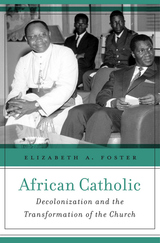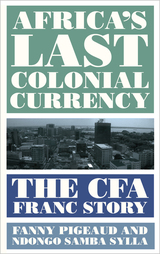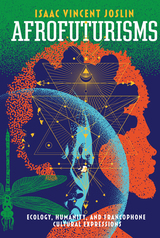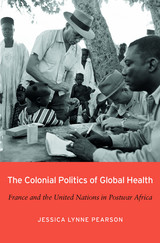
Winner of the John Gilmary Shea Prize
A groundbreaking history of how Africans in the French Empire embraced both African independence and their Catholic faith during the upheaval of decolonization, leading to a fundamental reorientation of the Catholic Church.
African Catholic examines how French imperialists and the Africans they ruled imagined the religious future of French sub-Saharan Africa in the years just before and after decolonization. The story encompasses the political transition to independence, Catholic contributions to black intellectual currents, and efforts to alter the church hierarchy to create an authentically “African” church.
Elizabeth Foster recreates a Franco-African world forged by conquest, colonization, missions, and conversions—one that still exists today. We meet missionaries in Africa and their superiors in France, African Catholic students abroad destined to become leaders in their home countries, African Catholic intellectuals and young clergymen, along with French and African lay activists. All of these men and women were preoccupied with the future of France’s colonies, the place of Catholicism in a postcolonial Africa, and the struggle over their personal loyalties to the Vatican, France, and the new African states.
Having served as the nuncio to France and the Vatican’s liaison to UNESCO in the 1950s, Pope John XXIII understood as few others did the central questions that arose in the postwar Franco-African Catholic world. Was the church truly universal? Was Catholicism a conservative pillar of order or a force to liberate subjugated and exploited peoples? Could the church change with the times? He was thinking of Africa on the eve of Vatican II, declaring in a radio address shortly before the council opened, “Vis-à-vis the underdeveloped countries, the church presents itself as it is and as it wants to be: the church of all.”



In The Colonial Politics of Global Health, Jessica Lynne Pearson explores the collision between imperial and international visions of health and development in French Africa as decolonization movements gained strength.
After World War II, French officials viewed health improvements as a way to forge a more equitable union between France and its overseas territories. Through new hospitals, better medicines, and improved public health, French subjects could reimagine themselves as French citizens. The politics of health also proved vital to the United Nations, however, and conflicts arose when French officials perceived international development programs sponsored by the UN as a threat to their colonial authority. French diplomats also feared that anticolonial delegations to the United Nations would use shortcomings in health, education, and social development to expose the broader structures of colonial inequality. In the face of mounting criticism, they did what they could to keep UN agencies and international health personnel out of Africa, limiting the access Africans had to global health programs. French personnel marginalized their African colleagues as they mapped out the continent’s sanitary future and negotiated the new rights and responsibilities of French citizenship. The health disparities that resulted offered compelling evidence that the imperial system of governance should come to an end.
Pearson’s work links health and medicine to postwar debates over sovereignty, empire, and human rights in the developing world. The consequences of putting politics above public health continue to play out in constraints placed on international health organizations half a century later.
READERS
Browse our collection.
PUBLISHERS
See BiblioVault's publisher services.
STUDENT SERVICES
Files for college accessibility offices.
UChicago Accessibility Resources
home | accessibility | search | about | contact us
BiblioVault ® 2001 - 2024
The University of Chicago Press









